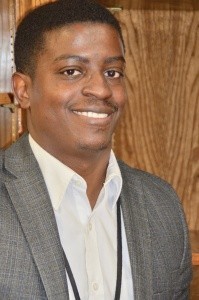Albert Brown doesn’t bury the lead. He couldn’t if he tried.
He’s one of those straight shooters who take aim, fires, hits.
All the while he’s looking you straight in the eyes, no wincing, no glancing over your shoulder for something bigger or better.
When locked in, he’s locked in.
So it went recently during a sit down with Brown in a conference room on the second floor of an Arlington ISD’s Annex office.

I’d come to chat about his marvelous accomplishments as the Title 1 Family Parent Facilitator for the district’s Dads Outreach initiative, launching programs and multiplying the number of campus-embedded Dad’s Clubs by merely fluctuating the culture of it.
Less than a minute in, though, Brown tells me he is moving on from AISD. Yep, leaving. Date for his departure has already been set.
The website for his new venture, the Noisiv Agency, is already up and running. Check it out at noisiv.org, he tells me.
Brown, a rising star here, had been moving and shaking AISD since 2017.
“What brought me to Arlington and AISD was a ministry role as a student pastor,” Brown says. He arrived from Little Rock to take up residence at Cornerstone Baptist Church.
In Arkansas, he worked a number of administrator gigs serving the community. “That’s always been my heart,” he says, smiling. “That’s what led me here. From there I transitioned to AISD with the opportunity to engage fathers. That was my passion. Still is.”
Exactly where that passion, now manifested through Noisiv, will take him – and Arlington – is still in the early stages, but Brown’s vision (spell vision backwards and you get the name) is to better equip organizations with resources to increase father engagement in education and children’s health. He’ll be a consultant, which is the role that might actually encompass his vast array of talent and fortitude.
The thing about talent is that it comes in all forms and can be singular or widely versatile – to Brown, it’s sort of an elastic concept born out of an unyielding desire to make a community healthier.
He’s been building up to this for a while now. Brown grew up in the Wakefield section of southwest Little Rock, which he saw transition from middle class to working class. He witnessed the challenges of navigating a community where as money moved out trouble moved in. At one point, Brown, like many others, hit a crossroad.
“I grew up most of my life having a dad at home. It wasn’t until later in life, around high school, when my parents divorced,” he says. “Some of the people I admired had negative behavior patterns. I learned a lot of those things.” Like defining masculinity with his fists or manipulating women.
“But I had other positive role models such as coaches who taught me about discipline, about controlling your anger.”
One of those positive role models was the IT director at the architecture firm where his mom worked. He took a liking to the young Brown, tucking him under his wing. Gave him an internship. Brought him to meetings. Asked his opinions. He gave Brown the book, “The Greatest Salesman in the World,” which talks about how to maximize what you have.
“It all helped me see that if I continue to think how I was thinking about life, it would limit me.”
Brown studied psychology at the University of Central Arkansas because, he figured, knowing how people think is the best way to help them, But after taking a job as a case manager, working mostly with teens under court supervision, he wasn’t so sure. Engaging them was “more about medicating them. For me, I was like, I don’t know if psychology is for me because I don’t feel that medication is the only solution.”
After obtaining a master’s in public health, Brown worked as an administrator for the city and state, and skills he learned he used as a youth pastor at Cornerstone, working one on one with teens on how they can find their purpose and more, importantly, how they can develop a relationship with God.
That led to his involvement at AISD. His whole career has circled around community development, serving others, finding ways to support people in finding – and living out –their purpose.
“Looking back at my experience, it helped me put my role of father engagement into perspective because most men don’t realize the value they add to their kids’ lives beyond just being able to protect,” he says.
Brown, a father of two whose wife, Katina, is his “motivator and motivation,” comes from a pretty simple perspective:
Every student has a male role model.
What Noisiv wants to know: Is that role model going in a negative or positive direction?

















